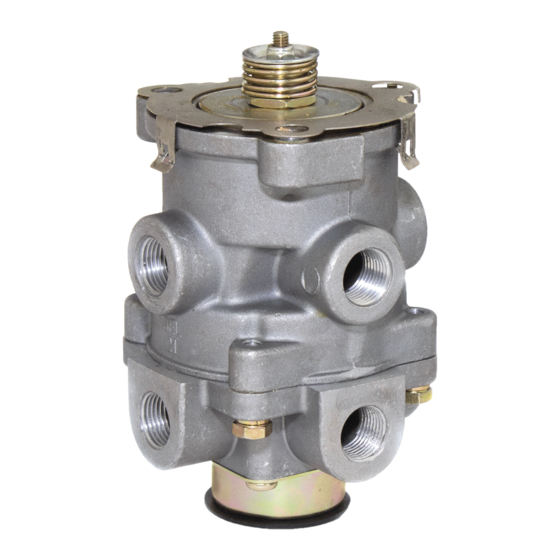- ページ 5
コントロールユニット BENDIX E-10のPDF サービスデータをオンラインで閲覧またはダウンロードできます。BENDIX E-10 6 ページ。 Dual brake valves

15. Disassemble the primary piston by rotating the spring
seat nut (25) counterclockwise. Separate the spring
seat nut, spring seat (26), rubber spring (27) and
remove the piston o-ring (28).
16. Remove the large (30) and small (31) o-rings from the
relay piston (20).
17. Remove the retaining ring (32) securing the primary
inlet and exhaust valve assembly (33) in the upper body
and remove the valve assembly.
CLEANING AND INSPECTION
1. Wash all metal parts in mineral spirits and dry.
2. Inspect all parts for excessive wear or deterioration.
3. Inspect the valve seats for nicks or burrs.
4. Check the springs for cracks or corrosion.
5. Replace all rubber parts and any part not found to
be serviceable during inspection, using only genuine
Bendix
®
brand replacement parts.
ASSEMBLY
Prior to reassembling, lubricate all o-rings, o-ring grooves,
piston bores and metal to metal moving surfaces with Dow
Corning 55 M pneumatic grease (Bendix piece number
291126).
Note: All torques specifi ed in this manual are assembly
torques and can be expected to fall off, after assembly
is accomplished. Do not retorque after initial assembly
torques fall.
1. Install the primary inlet and exhaust assembly (33) in
the upper body and replace the retaining ring (32) to
secure it. Be sure the retaining ring is seated completely
in its groove.
2. Install the large (30) and small (31) o-rings on the relay
piston.
3. Install the primary piston o-ring (28) in the piston o-ring
groove.
®
®
BENDIX
E-6
BRAKE VALVE ONLY:
4. Install the rubber spring (do not lubricate) (27), concave
side down in the primary piston (22) and place the
spring seat (26), fl at side up, over the rubber spring.
5. Install the primary piston spring seat nut (25), with its
hex closest to the spring seat, and rotate clockwise
until the top surface of the spring seat is even with the
top surface of the piston. Set aside.
6. Install large (30) and small (31) o-rings on relay piston
(20).
7. Place relay piston, spring (21) (if used) in concave
portion of relay piston and install relay piston through
No. 1 inlet/exhaust assembly (33) and into under side
of upper body.
8. Place screwdriver, blade up, in vise. Place stem (17) in
relay piston upper body sub assembly over the blade
of the screwdriver with blade engaged in the slot in the
head of the stem.
9. Place the washer (24) over the stem. This washer
should be installed in all valves.
10. Install primary return spring (23) in upper body piston
bore.
11. Install the primary piston rubber spring sub assembly
(steps 4 & 5) over the stem, into the upper body piston
bore.
12. Compress the primary and relay pistons into the upper
body from either side and hold them compressed,
either manually or mechanically. See the cautionary
note under step 11 in the Disassembly section of this
manual.
13. Place the stem spring (19) over the spring seat nut (25)
and the spring seat (18) over the stem.
14. Install the lock nut (16) on the stem and torque to
20 - 30 inch pounds.
15. Install the primary piston retainer (15) over the piston,
making certain all three lock tabs have engaged the
outer lip of the body.
GENERAL SAFETY GUIDELINES
WARNING! PLEASE READ AND FOLLOW
THESE INSTRUCTIONS TO AVOID PERSONAL
INJURY OR DEATH:
When working on or around a vehicle, the following
general precautions should be observed at all
times.
1. Park the vehicle on a level surface, apply the
parking brakes, and always block the wheels.
Always wear safety glasses.
2. Stop the engine and remove ignition key when
working under or around the vehicle. When
working in the engine compartment, the engine
should be shut off and the ignition key should be
removed. Where circumstances require that the
engine be in operation, EXTREME CAUTION should
be used to prevent personal injury resulting from
contact with moving, rotating, leaking, heated or
electrically charged components.
3. Do not attempt to install, remove, disassemble
or assemble a component until you have read
and thoroughly understand the recommended
procedures. Use only the proper tools and observe
all precautions pertaining to use of those tools.
5
